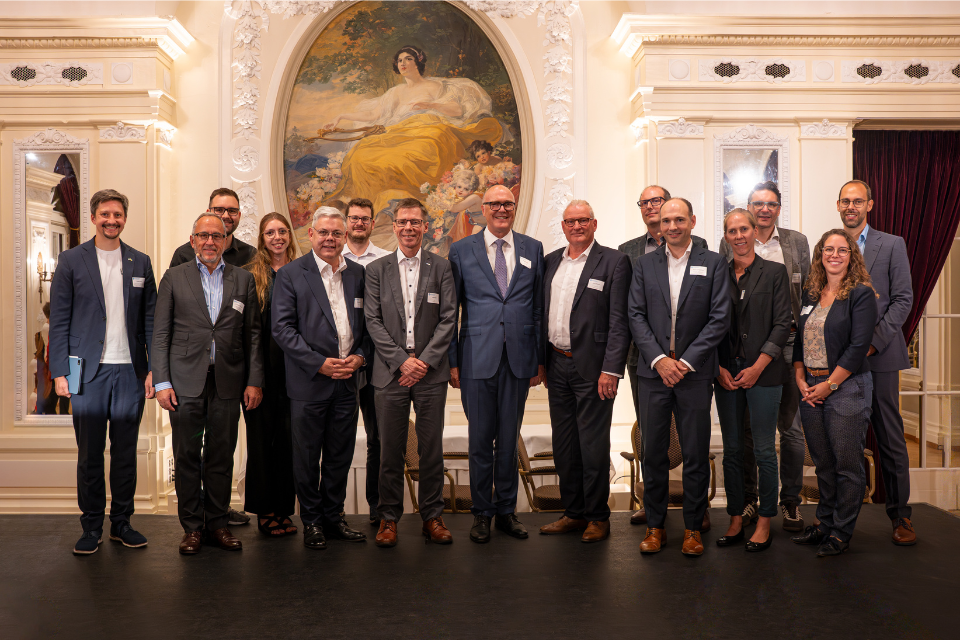
National Security – Vulnerability-Free Digital Products for a Secure Future
Annual Event of the National Test Institute for Cybersecurity NTC in collaboration with the National Cyber Security Centre NCSC
Wednesday, August 27, 2025 | BELLEVUE PALACE BERN
Note: The quotations have been translated from German.
Impressions & Insights
« The National Test Institute for Cybersecurity NTC closes a critical gap that the federal government alone cannot cover, and it fits perfectly into the National Cyber Strategy NCS. Such initiatives are of great importance to the federal government. »
Federal Councilor Martin Pfister, Head of the Federal Department of Defense, Civil Protection and Sport DDPS.
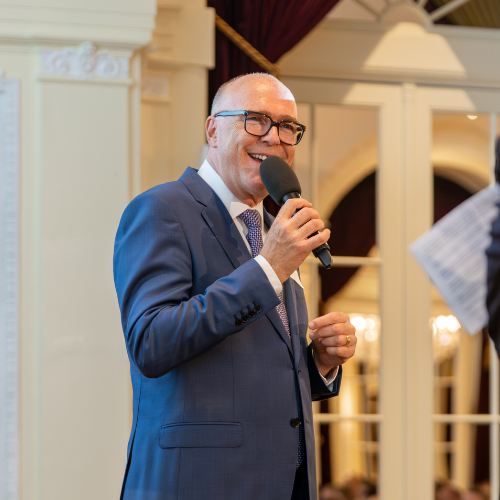
Collaboration between NCSC and NTC
Valentina Sulmoni, NCSC: « The NCSC lays the foundation for the secure use of digital services and infrastructures in Switzerland and enables the country to become one of the leading nations in secure digitalization. »
Andreas W. Kaelin, NTC: « Alongside commissioned projects, NTC also carries out initiative projects and conducts cybersecurity tests together with stakeholders—tests that otherwise would not be performed due to diffused responsibilities. »
Growing Threat Landscape – Preventable Attacks
-
Florian Schütz, Director NCSC: « Most successful attacks exploit known vulnerabilities. »
-
Member of Parliament Franz Grüter: « 99% of attacks on IoT devices used known, already fixed vulnerabilities. In addition, one out of three ransomware attacks exploited known but unpatched vulnerabilities. Closing these gaps is not an option—it is our duty.
-
Joël Mesot, President of ETH Zurich: « If cybercrime were a country, it would be the third largest in the world after the U.S. and China. »
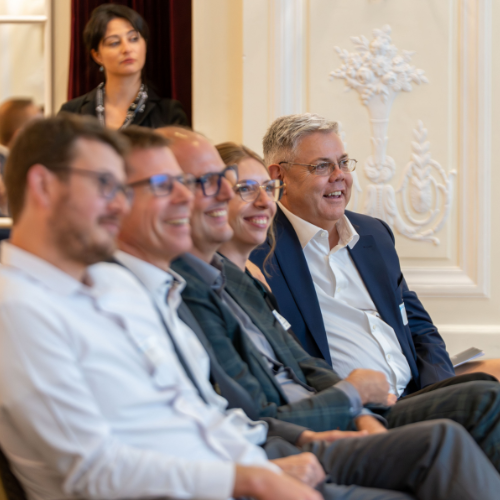
Identifying Critical Gaps Proactively and Driving Remediation
Tobias Castagna, NTC, and Brian Ceccato, NCSC, presented impressive examples of projects that close critical gaps:
- Open Source Software (OSS): 97% of Swiss organizations use OSS. A single vulnerability can affect thousands. The joint pilot project « OSS-Security » has already closed targeted vulnerabilities.
- Photovoltaic Systems: Hardly tested, yet highly critical for energy supply. NTC is currently conducting security reviews with partners.
- Hospital Information Systems (HIS): Responsibilities are often unclear. NTC found serious vulnerabilities in all three tested systems.
- Peripheral Devices: Equipment such as keyboards or headsets is rarely tested by organizations. Working in partnership with banks, cantons, and the federal government, NTC identified weaknesses.
Artificial Intelligence Raises the Bar for Digital Security
- Digital Sovereignty: Luukas Ilves highlighted that AI will play a central role in the future. Business models will increasingly scale through computing power rather than headcount, making digital sovereignty even more pressing.
- New Attack Surfaces: « AI is increasingly being used by attackers—and at the same time, it can make systems more resilient. » — Monica Ratte, FOCS
- Machine Learning: « Machine learning systems are increasingly the backbone of safety-critical digital applications—from bank card chips to processors to smart cameras, » said Heinz Tännler, Member of the Cantonal Government and Finance Director of the Canton of Zug.
Florian Tramèr, ETH Zurich: « The question is not if a machine learning model will fail, but when. »
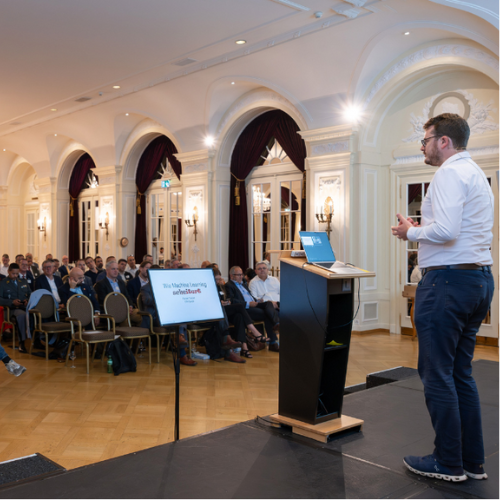
Research Collaboration ETH Zurich – NTC
Heinz Tännler, Member of the Cantonal Government and Finance Director of the Canton of Zug:
« For Switzerland’s security and digital sovereignty, we must develop AI-based security tools and research the foundations for secure, trustworthy machine learning systems. »
The Cantonal Government has proposed to the Cantonal Parliament the creation of two new professorships at ETH Zurich in these fields. Research and practice will be closely tied to NTC. Together, ETH Zurich and NTC are addressing the cybersecurity challenges posed by AI and machine learning that will shape Switzerland in the coming decades.

Success Factors for Switzerland
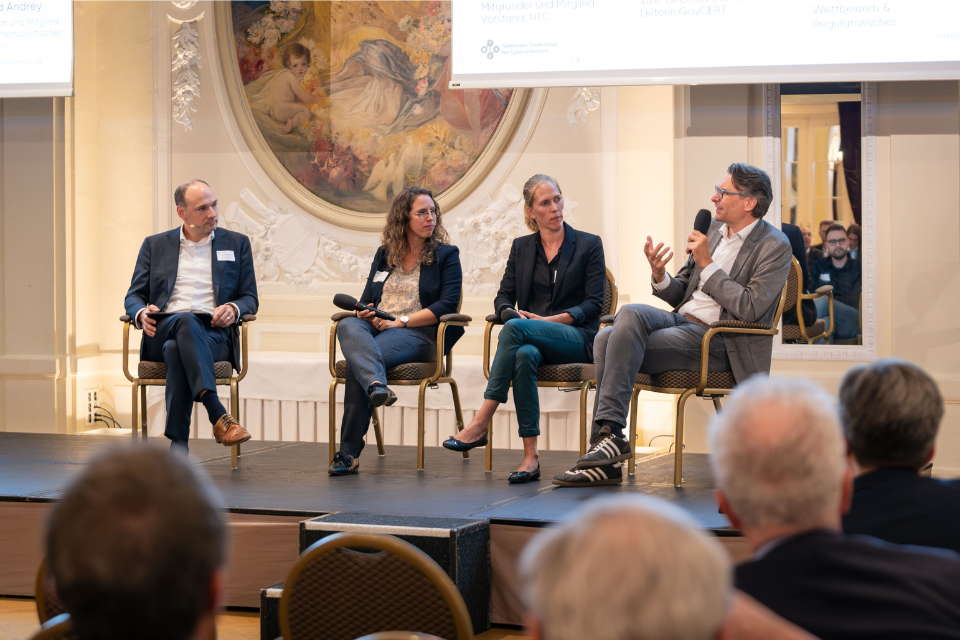
- Strengthening Resilience: « Even if complete freedom from vulnerabilities may remain a vision, every closed vulnerability is a contribution to Switzerland’s digital resilience. » — MP Franz Grüter
- Acting Together: « Switzerland is fantastically positioned in areas such as AI, quantum, and cloud computing. We have all the ingredients to become a digitally robust nation—the decisive factor is collaboration between the federal government, cantons, academia, and the private sector. » — Raphael Reischuk, NTC.
Angela Anthamatten, economiesuisse: « NTC and FOCS are valuable sparring partners—the cooperation of all actors is essential. » - Trust: « We need trustworthy digitalization for people—a state-issued, data-efficient e-ID makes the digital space safer. » — MP Gerhard Andrey
- Agility: Drawing on the examples of Estonia and Ukraine, Luukas Ilves emphasized how important agility, flexibility, and urgency are for resilience: « Only if these factors are given greater weight can Switzerland fully unlock the potential of digital technologies. »
A sincere thank you to all speakers and guests for the inspiring exchange.
